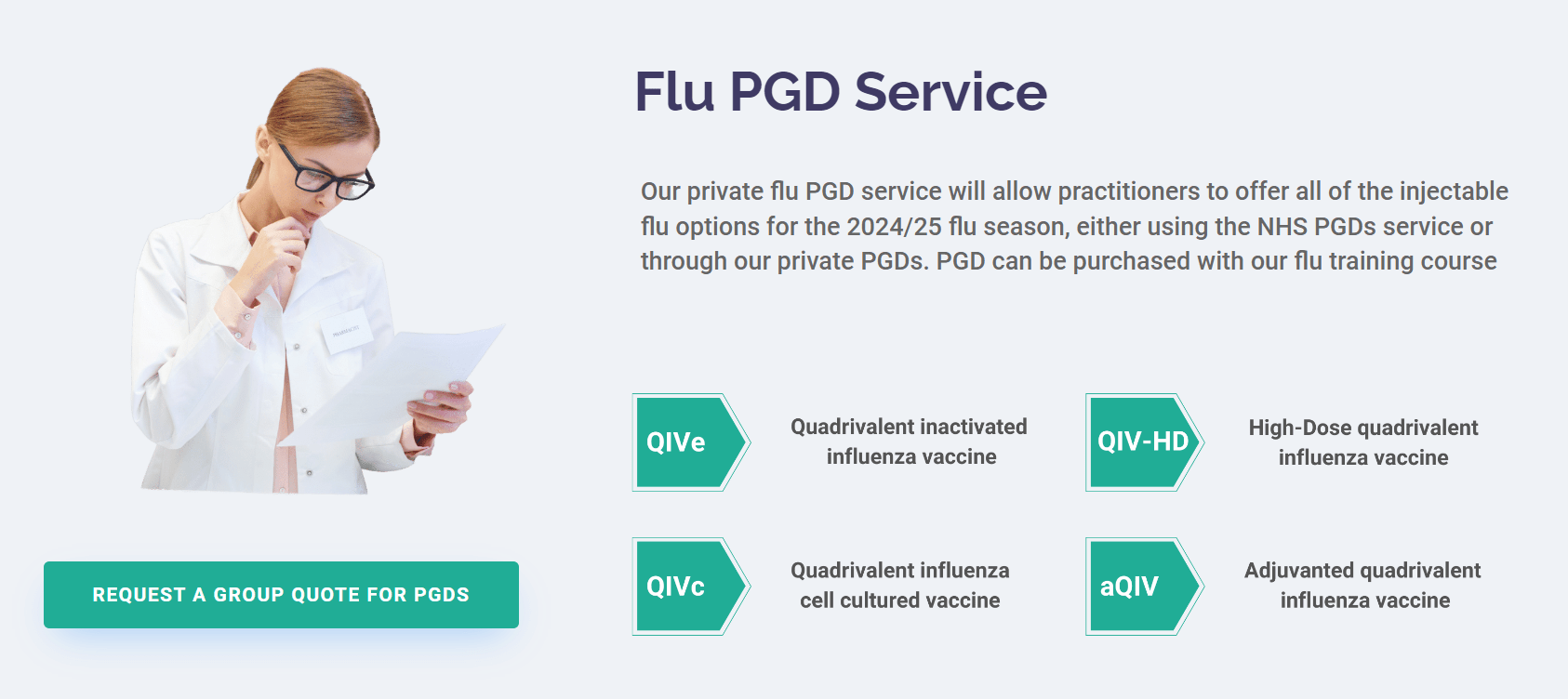
Patient group directions (PGDs) have long been a valuable tool for streamlining medication access in the UK healthcare system. Traditionally, their use has been reserved for pharmacists and other registered healthcare professionals, however as of 26th June 2024, their application has been expanded to allow registered pharmacy technicians to supply and administer prescription-only-medications (POM) under PGDs in England, Scotland and Wales. This change signifies a positive development for both patients and healthcare professionals and is set to enhance the efficiency and accessibility of healthcare services.

PGDs are written protocols developed by a prescriber, outlining the conditions for supplying and/or administering specific medicines to a defined group of patients. They are designed for situations where individual prescriptions aren’t necessary, promoting efficiency and improved access to essential medications. Common examples of PGDs include:
PGDs ensure that medicines are supplied and administered safely and effectively, maintaining a high standard of patient care. They are often used in situations where:
The PGD serves as a decision-making tool for the healthcare professional, who is responsible for ensuring the individual aligns with the clearly defined criteria. Administration of medications under PGDs is restricted to specific qualified healthcare professionals as defined by the Human Medicines Regulations 2012 which will now include:

Pharmacy technicians have traditionally played a supportive yet critical role in ensuring the smooth operation of pharmacies. Their responsibilities encompass tasks like medication processing, inventory management, and patient education. This strong foundation in medication safety makes them well-positioned to take on the expanded responsibility of administering medications under PGDs.
With this new addition to their role granted by the legislative amendments, pharmacy technicians can now play a more direct role in patient care. This development allows registered pharmacy technicians to provide essential services, potentially freeing up pharmacists to focus on more complex clinical duties.
To use a PGD, a healthcare professional must be specifically authorised to supply and administer medications under that particular PGD. Registered healthcare professionals working under PGDs are accountable to their professional regulatory bodies and they bear professional responsibility for each patient treated, ensuring patient safety throughout the process.
To ensure competency, registered pharmacy technicians must complete relevant training specific to the PGD in question. This training should covers the medication itself, potential side effects, administration techniques, and identification of contraindications. They must demonstrate they have the necessary skills and knowledge and their competency should be assessed through practical assessments overseen by a pharmacist.

This expansion offers several advantages:
Pharmacists can dedicate more time to complex clinical services, such as medication reviews, patient consultations, and managing chronic conditions. This maximises their expertise and allows them to focus on areas where their advanced clinical knowledge is most valuable.
Patients won’t need to wait for an appointment with a doctor or pharmacist to receive routine medications covered by a PGD. Receiving the medications they need faster, reduces delays in care that can worsen health outcomes. This can be particularly beneficial for patients who might struggle to access a doctor’s appointment or have difficulty traveling to see a healthcare professional during traditional working hours.
Pharmacy technicians will gain valuable experience in medication administration, fostering a more skilled and well-rounded pharmacy team. This not only empowers pharmacy technicians but also allows pharmacists to delegate tasks with confidence, knowing their colleagues possess the necessary training and competency.
With the expanded role of pharmacy technicians under PGDs, pharmacies can become a first point of contact for managing minor illnesses. This will increase access to timely care, particularly in underserved areas or during high-demand periods like flu season. By streamlining medication access through PGDs, pharmacies can also help alleviate pressure on the NHS by freeing up doctors’ time for more complex medical consultations.

While the change is positive, some considerations are important:
Ensuring proper training and clear guidelines for pharmacy technicians using PGDs is crucial. As this is a new development, training and practice standards for pharmacy technicians using PGDs may need to be developed and implemented consistently across the UK. This will ensure a high level of care and minimise potential risks. Pharmacists need to be comfortable delegating tasks and providing ongoing support to pharmacy technicians administering medications under PGDs.
PGDs need to be clear, concise, and specific to the medication and patient group involved. They should outline inclusion and exclusion criteria, potential side effects, and clear instructions for medication administration. Regular review and updates of PGDs are essential to reflect any changes in medication recommendations or best practices.
Ensuring that regulatory bodies provide ongoing oversight and support to maintain high standards of practice and address any emerging challenges.

As the healthcare landscape evolves, further integration of pharmacy services within the NHS is a key objective. By leveraging the skills of the entire pharmacy team, including pharmacy technicians, community pharmacies can expand their role in providing NHS clinical services. This shift is expected to enhance patient access and reduce pressure on other parts of the healthcare system, ultimately improving patient care and outcomes across the UK.
As the changes progress and are implemented, it will be crucial to monitor its effectiveness through data collection and feedback from patients and healthcare professionals. This will ensure that PGDs continue to be a safe and efficient way to deliver medications to patients while maximising the expertise of the entire pharmacy team. As healthcare professionals, embracing this change and supporting our pharmacy technician colleagues through adequate training and collaboration will be crucial to realising the full benefits of this change in practice.

At Health Academy we are pleased to offer a comprehensive set of Flu PGD packages that can be purchased with our flu training courses. We issue certificates and PGDs on completion of training. The Flu PGD and training packages are suitable for any healthcare workers wishing to administer the annual flu vaccine and who can do so under a PGD.
Important: Private Flu PGD’s can only be used in practice with agreement of the organisation you are working within. Therefore the PGD will only be valid for use once approved for use internally.

Visit our Flu Hub to find out more information about the training courses we offer. Whether you are new to vaccinating, looking for an annual update, or just looking for specific information about Flu vaccines for the 2024/25 season you will find a course here for you or your organisation.
Our courses provide all you need to need about the vaccinations and service to get you prepared ahead of the next season. Alongside our E-learning training, we also offer virtual and face-to-face flu workshops including BLS and anaphylaxis training which is great for those who want to get hands on and practical. Contact us now to save your date for you and your team!
Giving you written and video content to answer all your questions on primary care education from Phlebotomy to Travel Health.
Subscribe now to be kept updated with our latest posts and insights.
Start typing to search courses, articles, videos, and more.